Events and Activities
New journal article introduces research on relation between political activism and well-being
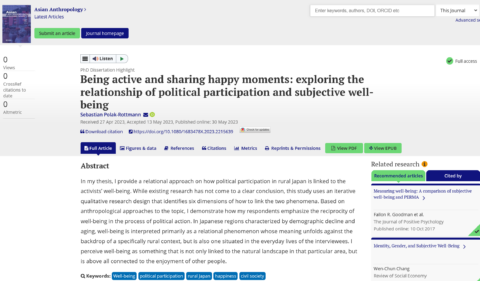
How is political participation in rural Japan linked to the activists’ well-being? In “Being active and sharing happy moments: exploring the relationship of political participation and subjective well-being” (Asian Anthropology, online first) DIJ political scientist Sebastian Polak-Rottmann provides insights into his doctoral dissertation, a qualitative study of the relationship between subjective well-being and political participation in Japan’s Aso region. His study uses an iterative qualitative research design that identifies six dimensions of how to link the two phenomena. In Japanese regions characterized by demographic decline and aging, well-being is interpreted primarily as a relational phenomenon whose meaning unfolds against the backdrop of a specifically rural context. However, his research shows that it is also situated in the everyday lives of the interviewees and connected to the enjoyment of other people. Sebastian’s doctoral dissertation is available full-text in open access (in German) here
Special issue of Contemporary Japan on Tokyo Olympics 2020
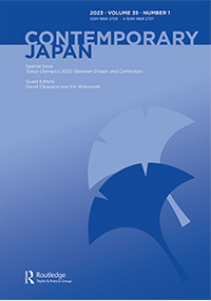
We are pleased to announce the publication of a Special Issue of Contemporary Japan (vol. 35, no. 1) on “Tokyo Olympics 2020: Between Dream and Contention”, guest edited by David Chiavacci and Iris Wieczorek. The issue features an interdisciplinary collection of seven articles covering the success/failure of the Olympics for various stakeholders, urban development strategies, media narratives, online political discourses, the anti-Olympic movement, Olympic reality and fantasy in the anime Akira, and a theoretical critique of capitalist realism, as well as two commentaries critiquing the costs and corruption of the Games and Japan’s treatment of migrants in the name of Olympic preparations. Rounding out the issue, our book review section covers English and Japanese language publications from the fields of history, policy studies, and anthropology. Please see the full issue here
New book chapter by Harald Kümmerle studies information banks in Japan
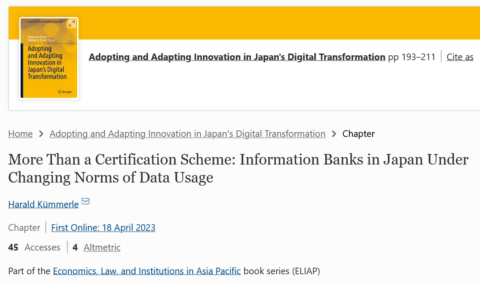
The Japanese certification scheme for information banks has recently received attention as an important example in the regulation of data intermediaries. The book chapter “More Than a Certification Scheme: Information Banks in Japan Under Changing Norms of Data Usage” by Harald Kümmerle explains why information banks matter for processing customer data in Japan and as theoretically rich examples of data intermediaries. His study traces the information bank concept to its origins in the 2000s, providing context on how the certification scheme came into existence in the late 2010s. The long-term success of the concept nationally would be eased if Japan succeeds in promoting Data Free Flow with Trust for less sensitive data internationally. Harald’s chapter was published in Adopting and Adapting Innovation in Japan’s Digital Transformation (eds. Anshuman Khare/William W. Baber, Springer 2023). It is an outcome of his research project The discourse on the digital transformation in Japan: an analysis based on the concept of data.
Open access journal article by David M. Malitz investigates Japanese influence on Siam/Thailand
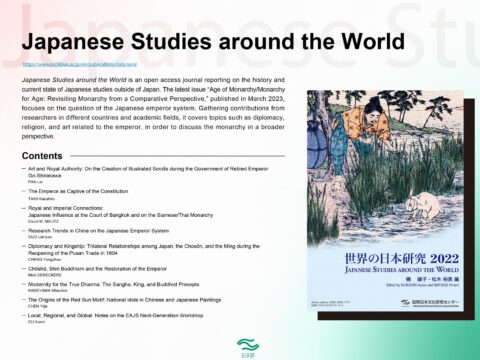
A new article by David M. Malitz investigates Japanese cultural and political influences in the Kingdom of Siam, renamed Thailand in 1939. Early exchanges in the late 16th and early 17th centuries saw the consumption of Japanese products in the Southeast Asian kingdom as status symbols. Japanese swords in particular were cherished and have become dynastic heirlooms since then. From the late 19th century onward, Imperial Japan was seen as a role model of successful modernization in Bangkok and Japanese advisors and instructors were hired by the court. Critics of the absolute monarchy meanwhile stressed that Imperial Japan had become a great power as a constitutional monarchy. “Royal and Imperial Connections: Japanese Influence at the Court of Bangkok and on the Siamese/Thai Monarchy” was published in Japanese Studies Around the World 2022 (eds. Ayako Kusonoki/Hiromi Matsugi, Nichibunken 2023) and is available open access. The article is an outcome of David’s research project Japanese-Thai Relations: Past, Present, and Future.
DIJ Newsletter Spring 2023
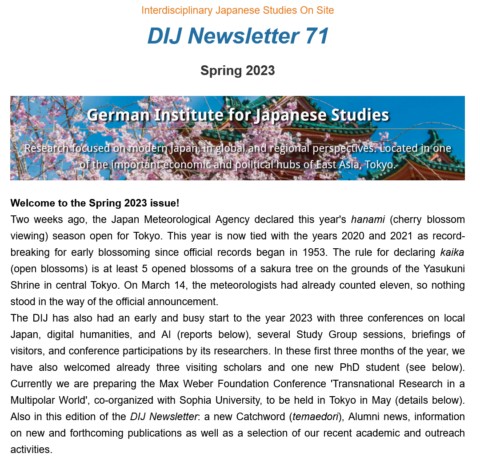
The spring issue of our DIJ Newsletter provides up-to-date insights into our research and publication activities, looks back to recent DIJ events, introduces new researchers, and gives updates on our outreach as well as on DIJ alumni activities. We hope you will enjoy exploring this new edition of the DIJ Newsletter. If you haven’t done so yet, you can subscribe to receive our Newsletters directly to your inbox. The full issues and subscription form are available here.
Discussion Paper on Japan’s monetary policy co-authored by Markus Heckel
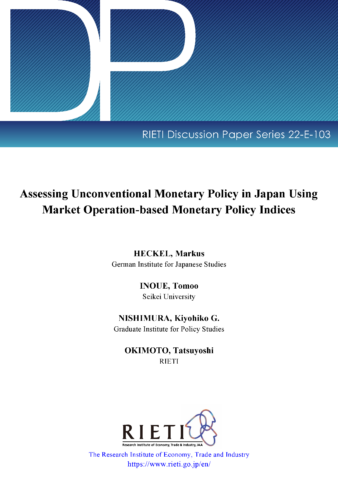
DIJ economist Markus Heckel has co-authored the discussion paper Assessing Unconventional Monetary Policy in Japan Using Market Operation-based Monetary Policy Indices which was published in the RIETI Discussion Paper series in November 2022. Together with his co-authors Tomoo Inoue (Seikei University), Kiyohiko G. Nishimura (Graduate Institute for Policy Studies), and Tatsuyoshi Okimoto (Research Institute of Economy, Trade and Industry, RIETI), Markus analyzes the effectiveness of unconventional monetary policy (UMP) from 2002 to 2019. Their study quantifies the effect of UMP carried out by open market operations on the macroeconomy in Japan based on four market operation-based monetary policy indices. The results indicate that there were three distinctive regimes with different policy impacts and that UMP carried out using market operations was the most effective in the second regime (mid-2008 to mid-2016). The discussion paper is freely available for download here
Special journal issue on Abe’s legacy for Southeast Asian relations

The latest volume of the open-access Kyoto Review of Southeast Asia investigates Shinzo Abe’s legacy for the future of Japanese-Southeast Asian relations. It was guest edited by DIJ historian David M. Malitz who also contributed the article “Japanese-Thai Relations through Two Coups: Back to Business”. In it, David traces the positive development of Japanese-Thai relations under Abe’s government (2006-07, 2012-20) during times of political instability in Thailand. The special issue also contains articles on Shinzo Abe’s military legacy for Indonesia (Bima Prawira Utama), Philippine-Japan relations (Karl Ian Cheng Chua), Japan-Singapore relations (Kei Koga), and Vietnam-Japan relations (Hoang Minh Hang). All articles can be accessed freely via the journal’s website here
DIJ Newsletter Winter 2022/23
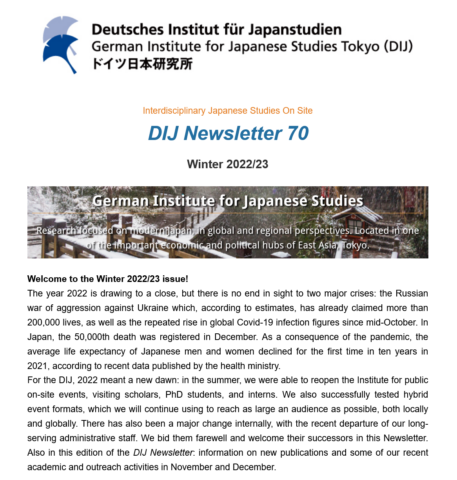
The winter issue of our DIJ Newsletter provides up-to-date insights into our research and publication activities, looks back to recent DIJ events, introduces new staff, and gives updates on our outreach as well as on DIJ alumni actvities. We hope you will enjoy exploring this new edition of the DIJ Newsletter. If you haven’t done so yet, you can subscribe to receive our Newsletters directly to your inbox. The full issues and subscription form are available here.





 Open Access
Open Access
